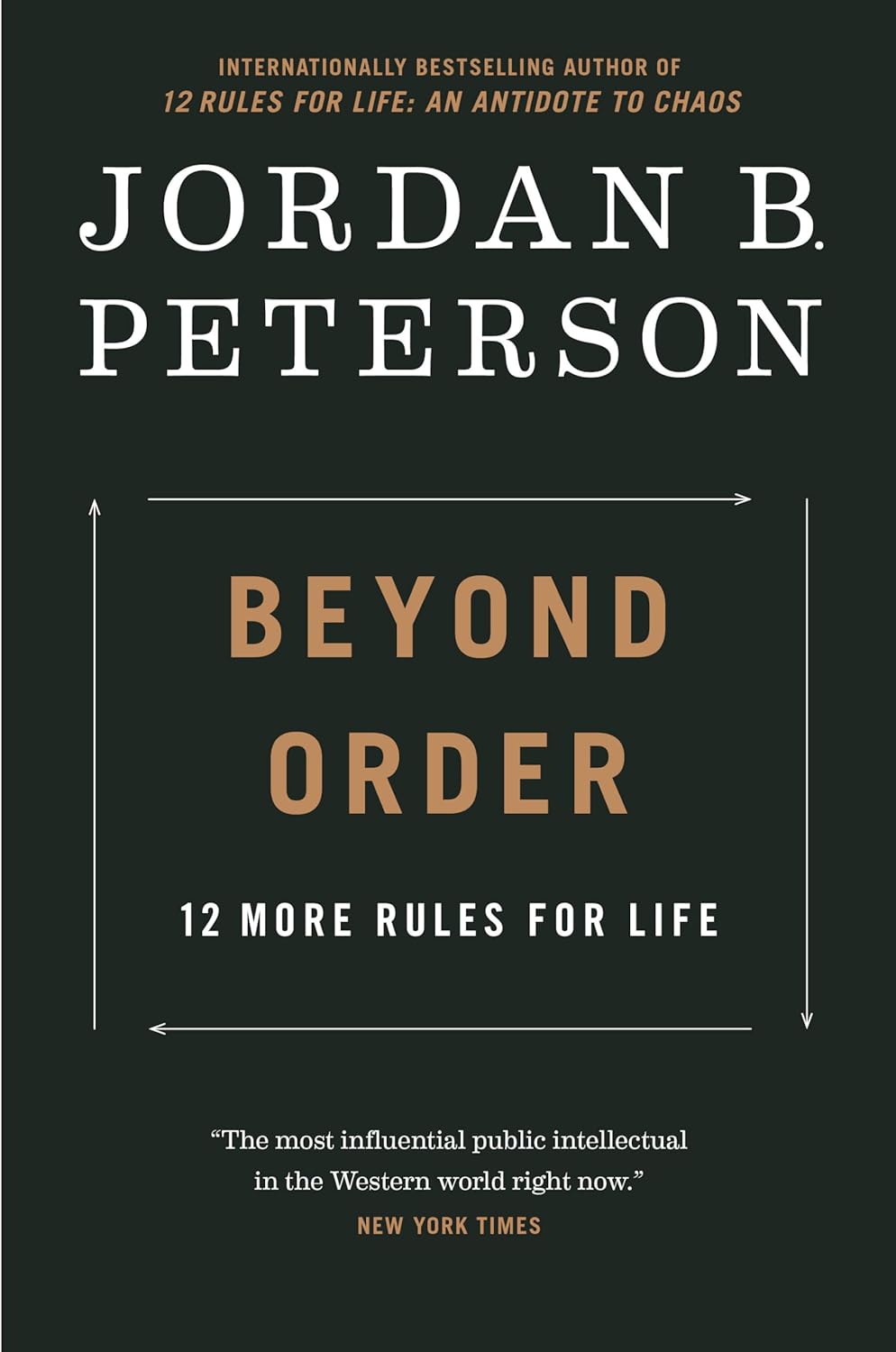Jordan B. Peterson
Beyond Order: 12 More Rules for Life
Beyond Order: 12 More Rules for Life
Couldn't load pickup availability
Share
The companion volume to 12 Rules for Life offers further guidance on the perilous path of modern life.
In 12 Rules for Life, clinical psychologist and celebrated professor at Harvard and the University of Toronto Dr. Jordan B. Peterson helped millions of readers impose order on the chaos of their lives. Now, in this bold sequel, Peterson delivers twelve more lifesaving principles for resisting the exhausting toll that our desire to order the world inevitably takes.
In a time when the human will increasingly imposes itself over every sphere of life—from our social structures to our emotional states—Peterson warns that too much security is dangerous. What’s more, he offers strategies for overcoming the cultural, scientific, and psychological forces causing us to tend toward tyranny, and teaches us how to rely instead on our instinct to find meaning and purpose, even—and especially—when we find ourselves powerless.
While chaos, in excess, threatens us with instability and anxiety, unchecked order can petrify us into submission. Beyond Orderprovides a call to balance these two fundamental principles of reality itself, and guides us along the straight and narrow path that divides them.

Editorial Reviews
PRAISE FOR JORDAN PETERSON
“We live in a time when so many young (and not so young) people feel lost . . . Mr. Peterson talks about the attitudes that will help find the path. It is not a politically correct or officially approved path, but it is an intensely practical and yet heightened one: This life you’re living has meaning.”—PEGGY NOONAN, Wall Street Journal
“Jordan Peterson is universally revered—and feared—for his incredible intellect and emotional insight.”—DAVE RUBIN, host of The Rubin Report and author of Don’t Burn This Book
“The Peterson way is a harsh way, but it is an idealistic way—and for millions of young men, it turns out to be the perfect antidote to the cocktail of coddling and accusation in which they are raised.”—DAVID BROOKS, New York Times
“The world needs Jordan Peterson.”—DOUGLAS MURRAY, author of The Madness of Crowds
About the Author
Jordan Peterson is a Canadian clinical psychologist, cultural critic, and professor of psychology at the University of Toronto. His main areas of study are the psychology of religious and ideological belief, and the assessment and improvement of personality and performance.
From 1993 to 1997, Peterson lived in Arlington, Massachusetts, while teaching and conducting research at Harvard University as an assistant and an associate professor in the psychology department. During his time at Harvard, he studied aggression arising from drug and alcohol abuse, and supervised a number of unconventional thesis proposals. Afterwards, he returned to Canada and took up a post as a professor at the University of Toronto.
In 1999, Routledge published Peterson's Maps of Meaning: The Architecture of Belief. The book, which took Peterson 13 years to complete, describes a comprehensive theory for how we construct meaning, represented by the mythical process of the exploratory hero, and provides an interpretation of religious and mythical models of reality presented in a way that is compatible with modern scientific understanding of how the brain works. It synthesizes ideas drawn from narratives in mythology, religion, literature and philosophy, as well as research from neuropsychology, in "the classic, old-fashioned tradition of social science."
Peterson's primary goal was to examine why individuals, not simply groups, engage in social conflict, and to model the path individuals take that results in atrocities like the Gulag, the Auschwitz concentration camp and the Rwandan genocide. Peterson considers himself a pragmatist, and uses science and neuropsychology to examine and learn from the belief systems of the past and vice versa, but his theory is primarily phenomenological. In the book, he explores the origins of evil, and also posits that an analysis of the world's religious ideas might allow us to describe our essential morality and eventually develop a universal system of morality.
Harvey Shepard, writing in the Religion column of the Montreal Gazette, stated: "To me, the book reflects its author's profound moral sense and vast erudition in areas ranging from clinical psychology to scripture and a good deal of personal soul searching. ... Peterson's vision is both fully informed by current scientific and pragmatic methods, and in important ways deeply conservative and traditional."
In 2004, a 13-part TV series based on his book Maps of Meaning: The Architecture of Belief aired on TVOntario. He has also appeared on that network on shows such as Big Ideas, and as a frequent guest and essayist on The Agenda with Steve Paikin since 2008.
In 2013, Peterson began recording his lectures ("Personality and Its Transformations", "Maps of Meaning: The Architecture of Belief") and uploading them to YouTube. His YouTube channel has gathered more than 600,000 subscribers and his videos have received more than 35 million views as of January 2018. He has also appeared on The Joe Rogan Experience, The Gavin McInnes Show, Steven Crowder's Louder with Crowder, Dave Rubin's The Rubin Report, Stefan Molyneux's Freedomain Radio, h3h3Productions's H3 Podcast, Sam Harris's Waking Up podcast, Gad Saad's The Saad Truth series and other online shows. In December 2016, Peterson started his own podcast, The Jordan B. Peterson Podcast, which has 37 episodes as of January 10, 2018, including academic guests such as Camille Paglia, Martin Daly, and James W. Pennebaker, while on his channel he has also interviewed Stephen Hicks, Richard J. Haier, and Jonathan Haidt among others. In January 2017, he hired a production team to film his psychology lectures at the University of Toronto.
Peterson with his colleagues Robert O. Pihl, Daniel Higgins, and Michaela Schippers produced a writing therapy program with series of online writing exercises, titled the Self Authoring Suite. It includes the Past Authoring Program, a guided autobiography; two Present Authoring Programs, which allow the participant to analyze their personality faults and virtues in terms of the Big Five personality model; and the Future Authoring Program, which guides participants through the process of planning their desired futures. The latter program was used with McGill University undergraduates on academic probation to improve their grades, as well since 2011 at Rotterdam School of Management, Erasmus University. The Self Authoring Programs were developed partially from research by James W. Pennebaker at the University of Texas at Austin and Gary Latham at the Rotman School of Management of the University of Toronto. Pennebaker demonstrated that writing about traumatic or uncertain events and situations improved mental and physical health, while Latham demonstrated that personal planning exercises help make people more productive. According to Peterson, more than 10,000 students have used the program as of January 2017, with drop-out rates decreasing by 25% and GPAs rising by 20%.
In May 2017 he started new project, titled "The psychological significance of the Biblical stories", a series of live theatre lectures in which he analyzes archetypal narratives in Genesis as patterns of behaviour vital for both personal, social and cultural stability.
His upcoming book "12 Rules for Life: An Antidote to Chaos" will be released on January 23rd, 2018. It was released in the UK on January 16th. Dr. Peterson is currently on tour throughout North America, Europe and Australia.
Product details
-
Publication
Portfolio
-
Author
Jordan B. Peterson
-
Language
English
Lexile:
-
Pages
432
-
ISBN-13
9780593084649


